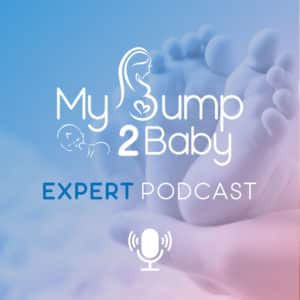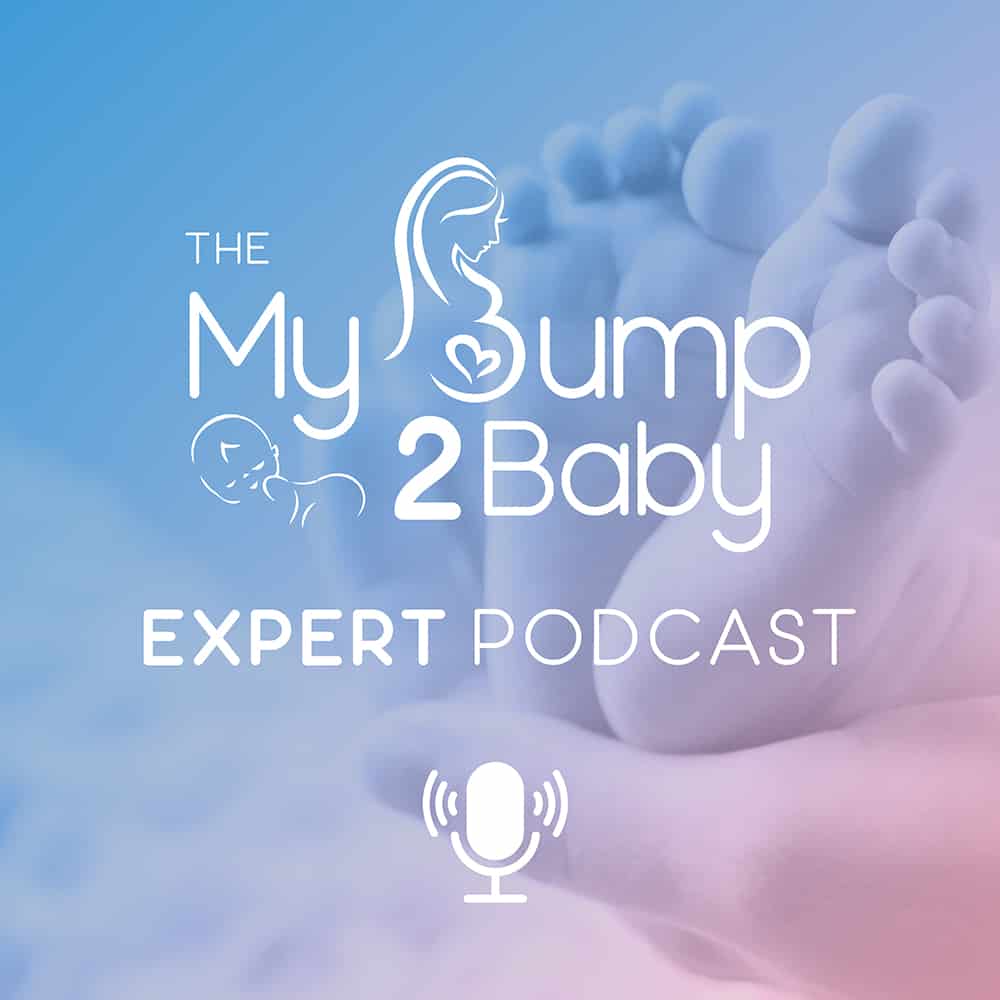- Everything you need to know about Colic
Today we are joined by Colic Expert, Rebecca Palmer from Colic SOS, Rebecca answers all your questions on Colic, from what Colic is, when does colic start, does every baby get colic, what can we do to prevent colic, and tips on soothing colic.
Here are Colic SOS’s social links:
https://www.facebook.com/colicsos/
https://www.instagram.com/colicsos/
Carla: [00:00:00] This podcast is sponsored by My Bump 2 Baby family protection and legal directory. Being a parent is such a minefield. It’s so difficult deciding who to select when it comes to financial advice or family law solicitors. My Bump 2 Baby works with one trusted financial advisor and one trust family law, solicitor in each town throughout the whole of the UK to find your nearest advisor or family law solicitor, head over to www.mybump2baby.com/familyprotectionlegal.
[00:00:53] Hello and welcome to My Bump 2 Baby Expert podcast, where we bring experts from all over the UK to answer your questions on everything, pregnancy to preschool.
[00:01:17] Today we have Colic expert, Rebecca Palmer talking about everything you need to know about colic. I hope you enjoyed this episode.
[00:01:34] Hello everybody. And welcome to My Bump 2 Baby Expert podcast. Today, I am joined by a colic expert, Rebecca Palmer from Colic SOS and Rebecca is going to be talking to us all about Colic. So, hi, Rebecca, how are you?
Rebecca: [00:01:54] Hello. Thank you for having me.
Carla: [00:01:56] Oh it’s lovely to have you on here. Honestly, I know colic was a very, very stressful time for me and also, um, obviously a lot of our listeners as parents. It’s one of those things that when you go through it, you absolutely know about it. So, um, I’m looking forward to having a chat with you today and just finding out a bit more about colic.
Rebecca: [00:02:16] Wonderful. I’m really happy to share my knowledge.
Carla: [00:02:19] Oh, amazing. So Rebecca, can we start with, what is colic?
Rebecca: [00:02:25] Okay, well, that’s a really big question. So it’s just a sweeping diagnosis given to a baby who is crying excessively. There is a rule of three, and that is if your baby is crying for three hours, three days a week for a period of three weeks then bingo you have colic, but it’s really more than that. It’s not just this crying baby its a collection of symptoms. So colic is just this overarching, um, diagnosis given to a crying baby, but actually what we need to think about is what’s really going on and the root cause of the baby’s issues.
[00:03:06] So there’s lots of triggers colic so you can call is six different types of colic. So you’ve got babies who has struggling with the trapped wind. This is probably one of the most obvious ones that people think about. But then there’s also babies who are struggling with reflux and that often gets diagnosed as just colic, but it’s never just Colic, you know?
[00:03:30] And then there’s things like allergies that also contribute on things like lactose intolerance also. And they all just gets classed as colic. But the idea is trying to find out what going on and that is your baby’s version of colic.
Carla: [00:03:46] That’s a really good answer. I see what you mean now. Uh, it’s a very broad spectrum, isn’t it? Yeah.
Rebecca: [00:03:52] Yeah, it is. And the idea is you can’t just treat a baby, with colic with random colic remedies. And that’s why there’s so many colic remedies out there as well. And they’re all not going to work for your baby. So you might find that Pam down the road swears by Infacol. It was the best thing ever, cured her baby. But yet you won’t find that that works for you. And that’s probably .Because it’s caused by a different issue.
Carla: [00:04:19] Yeah. I I’m just having memories now we’re flashing back to when George was younger. Do you know what? We spent an absolute fortune, listening to what people were saying, like, Oh, try this, try that, that worked for me, that worked for me before we know we’ve got this cupboard full of stuff and none of it actually works. So you’re absolutely right there. Um, so, so Rebecca, when does colic actually start then?
Rebecca: [00:04:43] So it usually raises its ugly head around six weeks old. And this is because there’s been like a buildup of milk so you’re going to get your reaction, but it can strike as early as newborn stage. And that’s usually the fourth trimester and then it can be also kind of a little bit later on. So it can be anytime from newborn up to six, eight weeks, and then. If it just kind of trapped wind, immature digestive, they all tend to die away again. That magic three months, but not always.
Carla: [00:05:20] No, no. It’s quite quite a long time then and I think you’re so sleep deprived anyway. And it’s just an added stress. Isn’t it? Um, with colics. So yeah. So does every baby get colic Rebecca?
Rebecca: [00:05:34] No, not every baby. You’ll find that some babies sail through the whole of that infancy and those perfect babies that sleep the night from three weeks old, they do exist somewhere. I haven’t had them, but not every baby, but they say about 50% of babies have some sort of episode throughout the first three months of their lives.
Carla: [00:06:01] Wow. That’s massive, isn’t it? One in every two babies. So, Rebecca, is there anything that we can do to prevent colic or is it just one of those things that happen?
Rebecca: [00:06:13] Well there’s certain things, how you have your baby. So if you have a cesarian section, your baby’s more likely to have colic just because of their gut microbiome. So if you have antibiotics as well during labor, or if your baby has antibiotics straight after birth, and that wipes out the gut microbiome. So your baby’s more likely to have colic. So it’s certain ways of making sure that we prepare for birth, that will help prevent colic. Also using methods to make sure your baby doesn’t take extra wind is also really good way of preventing colic. So if your baby’s taken in a huge gulps of air whilst they’re feeding, they’re much more likely to get those colic like symptoms, screaming arching their back, pulling up their knees because they’re in pain.
Carla: [00:07:06] Of course. Yes. No, that makes sense. That makes a lot of sense. So I think they can, they can get that as well when they’re drinking from bottles, is that right and breastfeeding? Cause they’re swallowing a lot of air?
Rebecca: [00:07:19] Yeah. So if you’re breastfeeding and your latch isn’t right. So whether that’s just because they’re just not latching on properly, or if they have something like a tongue, tongue and lip tie, then that can affect their latch. And then they’re just going to be taking in air as they’re drinking, but also it’s really relevant to bottle fed infants as well. Because again, they’re going to take in loads of air if they aren’t creating that seal properly around the teat.
Carla: [00:07:45] Right. Okay. So do you have any tips then on soothing colic?
Rebecca: [00:07:50] Oh yes. There’s loads of things you can do, but it is totally, again, depends on what, your baby’s colic is, and what it’s triggered by. If it’s a case that your baby is just immature to the world, they’re just waiting to get, their digestive system a little bit more mature, then things you can do such as making sure your baby isn’t getting any air in whilst feeding. That’s a really big one. Also making sure you’re shushing and swaying and rocking your baby because once you’re in pain, then you just want to be comforted. So that’s a one way of really comforting and soothing a colicky baby. Um, there’s, there’s a position called tiger in a tree. It’s an amazing colic hold because you’re putting your hand on their tummy and you place their head in the crook of your elbow facing down. So you take away all the stimulation around the room. So you’re immediately helping baby to settle. And because your hand is on their tummy, it helps provide that little bit of like, almost like a soothing. hand holding exercise on their tummy, it’s almost like a hot water bottle effect. And that’s another lovely way.
[00:09:05] And baby massage is brilliant for helping babies with colic as well, because you are not only getting the air out of their tummy, if it is caused by trapped wind, but you’re also happened with mature their digestive system. So we are one of the most immature mammals when we’re born, if you think of like a horse, they are kind of walking within a couple of hours of birth. Whereas our babies , our digestive system is so immature at birth that actually by massaging, it’s very scientific and I won’t bore everybody with the science, it’s something called myelination. Um, if you are a Sabrina the teenage witch fan like I was.
Carla: [00:09:48] Oh yes, absolutely. Yeah.
Rebecca: [00:09:55] Sabrina was writing myelination and it was saying like myelination is, and it never tells you the answer. I found that out as I was studying, it is the nerve endings. So as you are massaging your baby, you are coating the nerve endings and it means that there’s better brain to body communication. So this is how you’re helping mature the digestive system.
Carla: [00:10:19] Wow. So baby massage, is a great way to kind of help with this then. So you would advise go to baby massage classes?
Rebecca: [00:10:27] Oh, absolutely. Yeah. From the age of six weeks you can do baby massage and then they’re also massage teachers that can do massage from newborn. I’m one of them and I love doing my newborn nurture classes and it’s a very gentle, very short type of massage for a very young baby, but from six weeks you can do a full massage with them.
Carla: [00:10:52] Thats amazing. So, Rebecca, then, can you just tell us a bit more about you and what you do and where people can find you then if that’s okay?
Rebecca: [00:11:03] Yeah, of course. So I have my business, which is ColicSOS, and I’m a colic specialist and I provide a colic service where I do one to one consultations with clients. So families who are really struggling with colicky babies, I help get to the root of the issue. So as I was saying before colic is just a sweeping arch diagnosis and what I like to do is get to the bottom of it, figure out exactly what is going on with your baby and then be able to advise appropriate remedies. So it just stops that approach. So you really are directed to what is the issue. Um, so I do that. I also have an online fourth trimester course, which is really lovely for newborn babies. And again, that’s a lot of ways to prevent colic and ways to sooth newborn babies from the womb into the world.
Carla: [00:12:00] That sounds brilliant. So, Rebecca, I think that is, I mean, you’ve covered so much there. I had no idea about all those things with colic. I just thought it was like one thing I didn’t realize there was so many different factors, um, that could be, could be a reason for colic so that’s really, really helpful. Um, so Rebecca, thank you so, so much for coming on today.
Rebecca: [00:12:21] Oh, you’re very welcome. Thank you for having me.
Carla: [00:12:24] It’s lovely to have you, so we’ll speak to you soon, but what we’ll do is we’ll put Rebecca’s links in the show notes. So if you want to get in contact with Rebecca, you can do that. You’re happy for the questions on colic are you Rebecca?
Rebecca: [00:12:37] Oh, absolutely. And I’ve got a wealth of blogs on my website as well.
Carla: [00:12:41] Brilliant. Okay. Thank you so much, Rebecca.
Rebecca: [00:12:45] Thank you.
Carla: [00:12:47] Thank you for listening to My Bump 2 Baby Expert podcast. If you would like to find help and support from experts in your local area, head over to www.mybump2baby.com and you will also be able to find local pregnancy to preschool groups, classes, businesses, and services in your local area.











